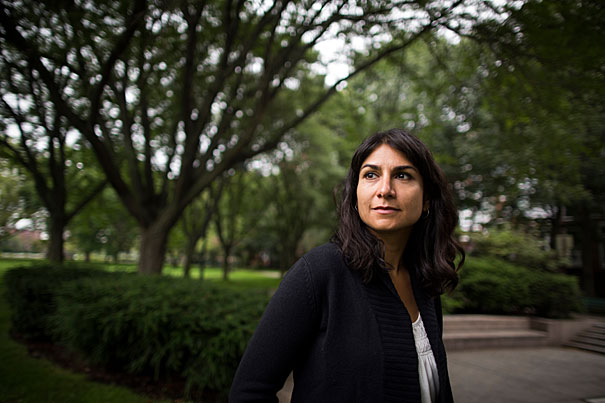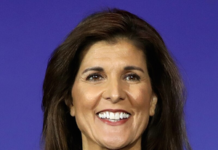
By Christina Pazzanese
Harvard Staff Writer/Harvard Gazette
News that special counsel Robert Mueller has empaneled a second grand jury in Washington, D.C., and has hired 16 top attorneys to work on the investigation into possible ties between the Trump campaign and Russian interference in the last U.S. election has stoked accusations in conservative media that the probe’s outcome is likely to be unfair and illegitimate.
President Trump and his top aides have led the outcry. They say that because several attorneys assisting Mueller and FBI Deputy Director Andrew McCabe either have donated to Democratic candidates or have spouses who accepted political donations from Democrats, Mueller’s findings should be questioned.
Maya Sen is a political scientist and associate professor at Harvard Kennedy School (HKS) who studies the politics of the legal profession, including those of lawyers, judges, law professors, and clerks. The Gazette spoke with Sen about the influence of politics in the law.

GAZETTE: Your research into the political leanings of lawyers finds that campaign donations don’t reliably predict bias. Why not?
SEN: A really important point of clarification is there’s a difference between whether your partisanship could influence your decision-making or how you carry out your job versus whether Bob Mueller went out and chose people on the basis of their party donations or party affiliation and whether that calls into question whether Mueller is an impartial special counsel. Those are two different questions.
On the second question, that’s where the Trump administration surrogates [have found] an argument that’s really resonated. It’s that “Bob Mueller can’t really be trusted with this investigation and his investigation is inherently partisan because he’s amassed a team where many members have donated more money to Democrats.” That’s the argument to which my research speaks. I’ve looked extensively at the party affiliations and the donation patterns of the legal profession, and what’s interesting about it is that if Bob Mueller was throwing darts at a wall and the wall had names of elite attorneys [on it], and he was randomly choosing, he would choose a team where the people mostly donate to Democrats. The reason why is because lawyers tend to be liberal. According to our research, 68 percent of lawyers who’ve made any political contributions give more money to Democrats than to Republicans. That pattern is even more striking when you look at elite lawyers.
Mueller’s legal team is the cream of the crop in terms of their professional and educational experience. Most members have attended a handful of extremely elite law schools, including those at the University of Virginia, the University of Chicago, Harvard, Yale, and Columbia. Among graduates of those top programs, among those who’ve made a contribution, 76 percent have given more money to Democrats than to Republicans. The pattern we see in the team [Mueller’s] assembled, that’s exactly what we would see if he was not using ideology or partisanship to guide his hiring decisions, which is what the Justice Department’s own rules tell him to do. It would be very surprising if he assembled a team where the majority of his lawyers had donated more money to Republicans than to Democrats. That would be a very unusual pattern for a legal team of this caliber.
GAZETTE: Why are lawyers predominantly liberal? Is that an imbalance that needs to be corrected?
SEN: That’s a great question. One thing that is important to make clear is this was not always the case. Historically, up until the 1960s, 1970s, the legal profession was pretty conservative. Through a lot of American history, certainly through very important political moments like the New Deal era, the bar was a conservative voice in American politics. Through the 1930s and the 1940s, the bar was opposed to a lot of progressive policies, a lot of redistributive policies, and also was opposed to increased regulation and government oversight.
This changed in the 1960s and 1970s with a push toward more engagement with Civil Rights issues and the use of the law in more progressive and Civil Rights-oriented ways. In the last 30 or 40 years, we have seen the bar move toward the left politically as a whole, particularly at the elite levels, as I mentioned. Why is this happening? What sustains this right now? We speculate a little bit because it’s really hard to test this; we don’t have the kind of data that you’d need. But in the United States today, it seems like a really important point in people’s lives is their early 20s. People who might become lawyers, they’ve just graduated from college and they’re trying to think about what career interest they might want to pursue, and one possible thing that could influence their decision about which career to pursue is their own personal politics.
So people who are more left of center might be interested in pursuing a career in law or in teaching or in public-spirited progressive sorts of areas, maybe medicine, maybe nursing, whereas people who are maybe more right of center are more interested in pursuing law-and-order professions, or business school, or accounting. We think there might be some ideological sorting that happens in this really important pivotal period in people’s young adulthood that then sets them down a career path where they apply to graduate programs or they pursue a career that’s in line with their developing political and ideological interests.
GAZETTE: Does the focus on political leanings or donations lend any credibility to the argument advanced by Trump and his surrogates that these lawyers can’t be trusted to be fair or to live up to their professional responsibility? And doesn’t promoting that correlation help undermine faith in the justice system and sow doubt in the objectivity or validity of the rule of law?
SEN: Yes. That is where the critics are going with this: “Well, we know that people’s ideologies and partisan attitudes might shape their decision-making, so if we know that Bob Mueller has hired a lot of people who contribute to Democrats, that could potentially impact the way that they approach this investigation and cause them to act biased in how they pursue this.”
There are a couple different problems with that reasoning. One is that Trump himself has given a lot of money to Democrats. He was very candid about this — he was trying to wield political influence, and he was donating strategically — so we can maybe set Trump aside. Even so, members of his family have donated in large numbers to Democrats, and members of his staff have donated in large numbers to Democrats. So by that same reasoning, the argument that Trump surrogates and those in the Trump administration … would have to acknowledge is that if we take this to its logical extreme, then that disqualifies members of Trump’s own administrative team.
Secondly, lawyers are a very politically active group. In the 113th Congress, which was several years ago, 156 out of 435 members of the House of Representatives, which is about 36 percent, were lawyers, and 55 senators [were lawyers], so 55 percent. Twenty-five out of 44 presidents, so about 56 percent of presidents, have been lawyers. They have very high representation in our branches of government, not just politically elected branches of government, but also in the judiciary. They have political interests, they’re passionate about American politics. So to say they shouldn’t be expressing their opinions, making contributions, and supporting candidates, that’s almost asking people to act contrary to their own interests and to what drove them to this career.
GAZETTE: In a separate paper, you recently looked at what influences public support for Supreme Court nominees. One surprising finding was that those people who are most informed about how the court works are most influenced by what you call “partisan signals.” Can you elaborate?
SEN: Candidates to a federal judgeship are presented as being nonpartisan. They’re named by a president, but we’re not introduced to them as a Republican or a Democrat. We’re introduced to them as Judge Neil Gorsuch or Judge Sonia Sotomayor, or Judge Elena Kagan. A lot of time and attention is spent on discussing their professional qualifications, educational experience, personal background, the way they approach legal thinking, and things like that. We don’t really focus on their ideological positions (we, meaning the public, the media, and also political actors). We use other signals to try to triangulate. The point the paper makes is that in the absence of asking Judge Gorsuch who he voted for in the last election, which would give us a really good signal about how he would vote on really politically important cases, we use other cues. We use the fact that he’s a white, middle-aged man, who comes from a Republican family, who was recommended by the Heritage Foundation, who had written a doctoral dissertation on the right to die — which he didn’t believe there was — whether he was affiliated with the Federalist Society, and things like that. So we use other cues to try to triangulate more precisely his actual stances on important topics that have political salience.
Judge Gorsuch is one example, but you could flip that and say Judge Sotomayor, when she was going through the course of her confirmation, it was somewhat similar in that she was never asked who she’d voted for, what political candidates she supported, or what her explicit political positions were … In the absence of really clear signals about a candidate’s partisan leanings or ideological position, members of the public look to things like race and gender and possibly religion and previous professional experience to try to figure out what that candidate stands for politically.
GAZETTE: Why is it important to study the politics of lawyers, clerks, law school professors, and judges? What conclusions can we fairly draw from that, and what else in this arena merits further analysis?
SEN: Why is it important to study the ideology of this group? Well, it’s because they turned out to be the most politically important professional class [given the predominance of lawyers in government and politics]. I think the criticism being made against the Mueller team nicely illustrates the importance of this work. It’s not appropriate to draw the conclusion of bias based on this one fact [of donations] alone. That Mueller has assembled a team that looks like this, that is not sufficient to support a claim of bias. To show a real claim of bias, we’d need to see evidence that they’re not carrying out the investigation carefully and methodically, that they’re not representing their client, which is the people of the United States, to the best of their capacities and as fairly and impartially as possible. It really would be unfair to undermine or dismiss or otherwise try to discredit the conclusions being made by this team based on the previous history of political donations that they’ve made.
One really important question in all of this is: Is this something that maybe the legal profession and other highly educated professions need to take seriously in terms of diversity of viewpoints? We have a separate paper that looks at law professors. Lawyers tend to be pretty left of center, but if you look at law professors, they’re really quite liberal. One of the points we make in the paper is that this does seem to be undermining the credibility of the legal academy in terms of making important recommendations on policies that affect the legal profession, legal education, and, more broadly, law and politics.
The example we look at is when Jeff Sessions was named by President Trump to be attorney general, there was a letter that was circulated and signed by something like 1,000 law professors [criticizing the move]. It was very quickly dismissed by political observers and by political actors. At Sessions’ hearing, the letter was brought up and mocked, everyone had a good laugh and then it was just set aside. That speaks to the fact that having more ideological diversity would benefit the legal academy and the legal profession more broadly. It would allow the recommendations to be taken more seriously and as a measure of something that’s not driven out of party interests. I think it’s important to think about that in terms of moving forward. One of the lessons to learn from this is that ideological diversity is important inherently, but it’s also important for engaging with public issues and gaining public credibility and public trust.
The other issue I think is important is that the legal profession leans more to the left than other similarly educated professions, but, as a whole, the election in 2016 was one in which education was really predictive of vote choice. Hillary Clinton garnered a strong majority of support among whites who had college degrees. (I think there might be some exceptions in terms of white men, but I think for the most part, she captured that group.) And Donald Trump was very successful among people who did not have college degrees — people with high school degrees or even less than a high school degree.
In addition to that, we’ve seen increased rhetoric that attacks expertise across different areas, not just law, so across climate science, across environmental science, the NIH [National Institutes of Health], that’s also been felt. Legal expertise is another version of that. I think it’s a little worrisome that expertise is being made a partisan issue. If expertise is made a partisan issue, then I think we’re in very dangerous territory in terms of moving policy forward and making policy decisions that have some basis in evidence. I’m not sure where this is going to go. Obviously, my research is not quite there yet, but I think that’s a really important question for researchers to think about, and for a conversation to be had about.
This interview has been edited for clarity and length.
(Reprinted with permission from Harvard Gazette.)















